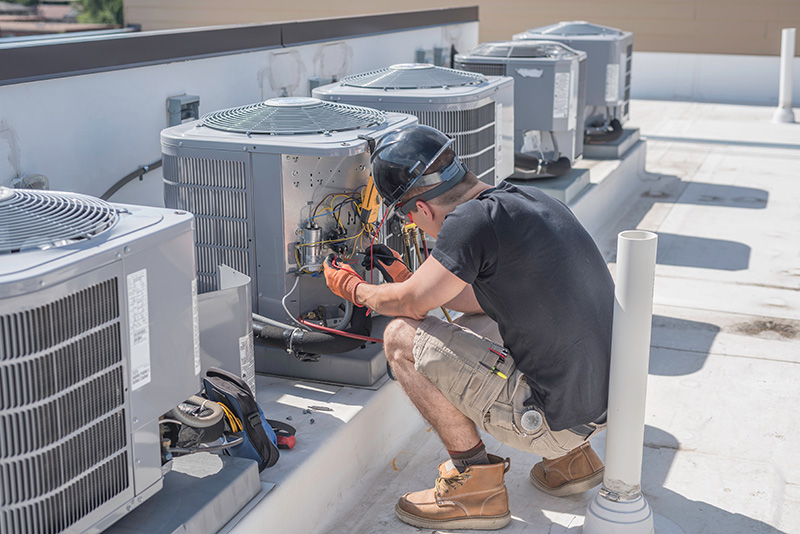Cost-Effective Maintenance Plans with DMAKS HVAC for Your HVAC System.
Cost-Effective Maintenance Plans with DMAKS HVAC for Your HVAC System.
Blog Article
Energy-Efficient Heating And Cooling Solutions to Save Money On Utility Bills
As power prices proceed to rise, the relevance of energy-efficient Heating and cooling systems comes to be increasingly evident. These systems not only promise substantial savings on utility costs yet also add to a much more lasting future by decreasing power usage.
Advantages of Energy-Efficient Cooling And Heating Solutions
Energy-efficient HVAC systems use many benefits that prolong beyond plain cost savings. One substantial advantage is the minimized ecological impact. By eating less power, these systems add to lower greenhouse gas emissions, aiding to deal with environment adjustment and promote sustainability. This lines up with enhancing social needs for green methods in household and business setups.
Furthermore, energy-efficient a/c systems frequently offer improved comfort levels. Numerous of these systems feature sophisticated innovation that permits much better temperature level control and enhanced air high quality (DMAKS HVAC). This results in a much healthier interior atmosphere, which is especially important for individuals with allergic reactions or respiratory system issues
Additionally, buying energy-efficient heating and cooling systems can enhance property value. As even more consumers prioritize power efficiency, homes and structures geared up with these systems may bring in higher quotes in the realty market.
Types of Energy-Efficient Cooling And Heating Options
Exactly how can home owners and businesses pick one of the most appropriate energy-efficient HVAC options for their demands? The market uses a range of energy-efficient a/c systems, each designed to improve comfort while lessening power usage.
One option is the variable refrigerant flow (VRF) system, which effectively regulates the temperature in multiple zones within a structure. This system adapts its refrigerant circulation to match the preferred temperature, bring about considerable power cost savings.
Another prominent choice is geothermal warmth pumps, which use the planet's stable temperature level to heat and cool areas. By moving warm to and from the ground, these systems show outstanding performance, especially in moderate environments.
Additionally, ductless mini-split systems supply an energy-efficient choice for homes lacking ductwork. These systems permit zone-specific heating & cooling, lowering energy waste in vacant locations.
Finally, high-efficiency heaters and ac system, with innovative SEER and AFUE ratings, provide trusted climate control while taking in much less power than conventional designs. By reviewing these alternatives, house owners and businesses can choose a cooling and heating system tailored to their particular requirements and power performance objectives.
Key Features to Think About

Next, investigate the sort of compressor used in the system. DMAKS HVAC. Variable-speed compressors can change their output to match the home heating or cooling down need, resulting in boosted comfort and power cost savings contrasted to single-speed models. In addition, search for systems outfitted with wise thermostats that supply programmable settings and remote gain access to, enabling much better control over power consumption
An additional critical feature is the system's air filtering ability. High-efficiency filters can enhance indoor air quality and decrease energy consumption by guaranteeing the system operates efficiently. Additionally, consider the type of refrigerant made use of; modern-day systems usually use green cooling agents that have a reduced ecological effect.
Last but not least, make certain that the system works with zoning technology, pop over to these guys which permits for tailored temperature control in different locations of your home, enhancing comfort while reducing power use.
Tips for Choosing the Right System


Next, consider energy performance rankings, especially the Seasonal Energy Efficiency Proportion (SEER) for cooling down systems and the Annual Gas Use Effectiveness (AFUE) for Visit Website heating unit. Greater scores indicate better effectiveness, which can result in significant financial savings on utility costs gradually.
Furthermore, evaluate the sort of heating and cooling system that best matches your lifestyle and spending plan. Choices include main air conditioning, ductless mini-splits, and heat pumps, each with its very own set of benefits and disadvantages.
Do not ignore the importance of correct installment and sizing; an incorrectly sized system can cause inadequacies and raised wear. Seek advice from with a professional Cooling and heating professional to acquire professional referrals tailored to your home's special needs. This extensive technique will certainly guarantee that you choose an energy-efficient HVAC system that meets your requirements and spending plan effectively.
Maintenance for Optimum Efficiency
When the appropriate HVAC system is in location, recurring upkeep becomes essential to making sure optimum performance and long life. A well-maintained system operates a lot more properly, causing lower energy usage and minimized energy costs. Normal inspections and tune-ups should be scheduled a minimum of twice a year-- once before the cooling season and once before the heating season.

Homeowners need to likewise be watchful concerning monitoring their cooling and heating system's performance. Uncommon sounds, varying temperature levels, or enhanced power bills can suggest underlying concerns that require instant focus. By dealing with these problems promptly, house owners can prevent expensive fixings and extend the life expectancy of their systems.
Spending in an upkeep plan with a qualified specialist not only boosts efficiency but likewise gives assurance, recognizing that the system is running at its best. DMAKS HVAC. Regular maintenance is for that reason important for maintaining power performance and reducing overall operational expenses
Final Thought
To conclude, energy-efficient HVAC systems present a practical service for minimizing energy expenses while boosting convenience and air top quality. By including innovative modern technologies and alternatives such as geothermal heatpump and ductless mini-splits, homeowner can accomplish considerable energy savings and add to environmental sustainability. Careful factor to consider of system attributes and recurring upkeep better makes certain ideal efficiency, making energy-efficient systems a prudent investment for both financial and eco-friendly advantages.
Report this page